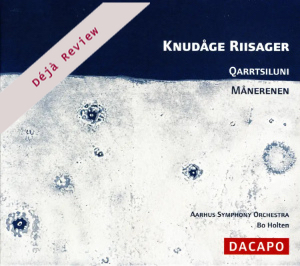
Déjà Review: this review was first published in November 2005 and the recording is still available.
Knudåge Riisager (1897-1974)
Qarrtsiluni (Expectant Stillness), Op 36 (1938)
Månerenen (Moon Reindeer), Op 57 (1956)
Aarhus Symphony Orchestra/Bo Holten
rec. 2004, Frichsparken, Århus, Denmark. DDD
Dacapo 8.226022 [56]
Riisager’s name is not easily forgotten. Even the look of it sticks in the memory. Some will recall it from his Trumpet Concertino, which was recorded by CBS (later Sony, Later BMG-Sony) as part of a Philadelphia Principals series. Chandos have also produced an exemplary orchestral collection. Dacapo have done him proud with various CDs: His solo piano music played by Christina Bjørkøe is on 8.226004 review. The chamber music on 8.224081 and the two Slaraffenland suites, Darduse and Tolv med Posten are on 8.224082.
Riisager was born in Estonia of Danish parents and earned his living as a mandarin in the Danish civil service. His musical grounding came from Otto Malling and Peder Gram, but his music took on a distinctive flavour from his Parisian years as a pupil of Paul le Flem and Albert Roussel. His orchestral music includes a Violin Concerto (still unrecorded) written for Wandy Tworek.
If his name is not easily forgotten, then neither is his music. Qarrtsiluni is the Inuit word for expectant stillness – a sense of being on the edge of something bursting into action. In fairness, the music seems to reflect both the imminence and the action itself. It is a fascinating concoction which connects diffusely with Bridge’s Enter Spring, Stravinsky’s Rite and the celebratory energy of de Falla and Janáček. This work began life as a purely orchestral piece but has been used for a ballet premiéred during the Nazi Occupation of Denmark.
Moon Reindeer is in the form of a Prelude and five scenes, the last of which is by far the longest at approaching twenty minutes. In the Prelude, one can hear the development from Qarrtsiluni. There is still the same Janáčekian canvas of constantly mobile detail – tonal and singing. Riisager wrote that in this piece he wanted to convey the gliding yet softly elastic sensation of skiing … of gravity cancelled. Again a sort of Nordic de Falla feeling arises with echoes of Copland’s western exuberance. Brightly dancing music occasionally recalls the Tippett of the Concerto for Double String Orchestra (as in scene 2 tr. 6) or the Midsummer Dances and sometimes of Bliss in Checkmate (recently recorded complete on Naxos). The Qarrtsiluni parallels return in the Reindeer Dance at the end of scenes 2 and 3 evoking the rustling freshness of spring in Bridge’s Enter Spring or Foulds’ April-England. There are some delightfully grace-filled Sibelian ideas, as in the recurrent and delicately pointed music in trs. 10 and 13. While ideas from the music of Greenland appear in Qarrtsiluni, material from Lapland has been incorporated in Moon Reindeer. This is brilliantly orchestrated and balanced music – moving forward in a disciplined blizzard of detail; the very antithesis of drab.
The Lapp-based story of Moon Reindeer has the girl Aili in love with the boy Nilas who prefers Kaisa. Aili goes to the sorcerer Naiden who draws her into a magic ritual where she is surrounded by women transformed into reindeer by Naiden who casts her into a gorge. There by night she lures men into the abyss and by day takes on the form of an erotically attractive young woman. Nilas falls for her, but in a fight with Aili in the form of the Moon Reindeer he kills her.
It’s a shame that Dacapo did not feel able to add the fascinating orchestral fantasy Archaeopteryx. There’s certainly space. Even so, this is the best sort of disc. It is one that when encountered makes you suddenly aware of another composer well worth exploring – add Riisager to your ‘to be investigated’ list.
Rob Barnett
See also review by Hubert Culot
Buying this recording via a link below generates revenue for MWI, which helps the site remain free




















